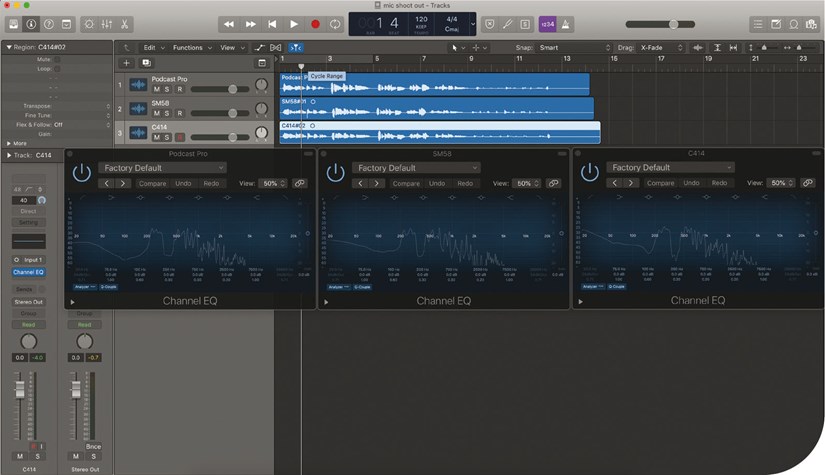Tech Reviews: Sontronics Podcast Pro
Wednesday, July 1, 2020
For musicians involved in online teaching this could be the perfect product.

It's always a joy when equipment turns up for review, because it means that I actually have the opportunity to make some music or do some recording. So, I was very pleased when the latest mic from British manufacturer Sontronics arrived on my doorstep.
The Podcast Pro makes its target audience clear – this mic is designed for the booming podcasting market. Everybody seems to be making a podcast these days (making my former commute more bearable) and having appropriate equipment with which to capture the audio is a good idea. Having a separate high-quality mic offers a big improvement over built-in microphones in phones and laptops, and is also useful for remote teaching. And, although this mic is aimed for podcasting – and therefore predominantly speech – it is suitable for some musical use, too.
When you open the box the first thing you are greeted with is a lovely note from the manufacturer congratulating you on your purchase – it's a simple thing – but it's a nice touch. The microphone is surrounded on all sides by foam and packaged in a cardboard box and sleeve. The mic itself is a reasonably substantial cylinder with a mounting bracket and two large thumb screws for adjusting the angle. Its shape is less reminiscent of an ice cream, as most vocal dynamic mics are, and looks a bit more like a can of drink. There is an XLR socket on the back of the mic for connection to a mixer or interface, but the mic can also connect to a range of devices via USB with the relevant adaptor cable. This last feature makes it a suitable choice for online gaming chat and can connect straight to your games console. I don't have a games console, so I mounted it on a stand, connected it to my interface and I was ready to go.

The Podcast Pro works well for both speech and music
Putting it to use
I am lucky to be married to a singer, and the first thing I actually used this mic for was a YouTube recording of some songs. For these performances, I was singing some backing vocals using the traditional Shure SM58 – the live mic of choice for many vocalists. The first thing I noticed when I came to mix the tracks was how much ‘fuller’ my wife's vocals sounded than mine. Admittedly she's a better singer than me, but I have produced both of our voices enough to know how we sound.
I then did a small mic shoot out between the Podcast Pro and a couple of other mics that I had available at home. I did this to hear the characteristics of the different mics (the Podcast Pro, a Shure SM58 and an AKG C414) to see what each one was bringing to the sound. In this case, I got my wife to sing the same line of music and then recite the same piece of text in all of the mics – I then listened back to the results. The Podcast Pro sounded warm and rich and had a nice emphasis in the low-mid frequency range, which are the frequencies that can make a spoken voice sound full. The SM58 was thinner in both speech and music. The AKG C414 is about six times the price of the Podcast Pro, so in some ways this was an unfair comparison, but I wanted to see how it would compare to a very commonly used condenser mic. The C414 had a flatter response but still sounded full in the mid frequencies. Interestingly, it was nowhere near six times better than the Podcast Pro – as the price indicated it should be.
The Technical Stuff
The Podcast Pro's specific voicing is a real advantage for vocal recording. Whether you're recording speech or singing, that emphasis in the low-mids adds depth to a voice that is sometimes lacking from other mics. It sat in a mix very easily – just by adding a bit of compression and some reverb, I had a really decent vocal sound.
The Podcast Pro is a super-cardioid microphone. This means that the pickup response is narrower than the usual heart shape polar pattern of a cardioid microphone. This slight narrowing of the pickup response means that the vocal mic is more directional and picks up less ambient noise. I didn't use any reflection filters or record in an acoustically treated space when doing the mic shoot out, and it had the least ambient noise by far. The Podcast Pro also features a built-in pop shield which means that plosive sounds – Ps, Bs and so on – are less distinct. When compared to the other two mics it fared very well, with the SM58 being significantly worse and the C414 being comparable.

Now we must come to the all-important question: price. The current retail price of the Podcast Pro is £99 – at this price it is a worthy addition to any music department. It would also make an excellent upgrade for teachers who are thinking of expanding their online work – or perhaps launching their own podcast series. I promise that the difference you'll hear between this and the built-in mic on your device will be staggering!
Summary
This mic is brilliant – it sounds great, is built well and is easy to use. I got amazing results on both speech and singing and at this price I would thoroughly recommend it to anyone looking for a new vocal mic. Although it's marketed to podcasters – it's much more than that. For musicians involved in online teaching it could be the perfect product.
Sontronics's Podcast Pro costs £99. To find out more, visit www.sontronics.com

